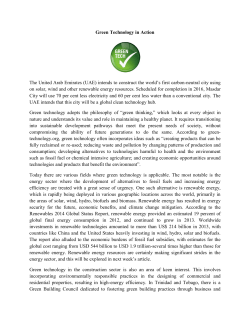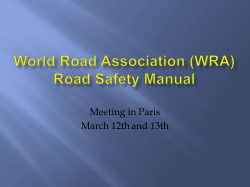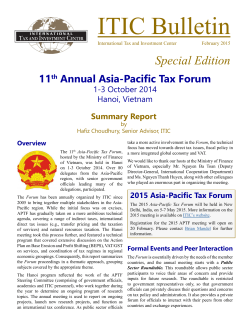
The 11 International Conference 30 March – 3 April 2015 Organizer
The 11th International Conference “ASIAN Community Knowledge Networks for the Economy, Society, Culture, and Environmental Stability” 30 March – 3 April 2015 Venue: Kathmandu, Federal Democratic Republic of Nepal Organizer: - Chiang Rai Rajabhat University, Thailand - Kathmandu University In Association with: - Pokhara University - Tribhuvan University - Purbanchal University - Yuxi Normal University - Choxiong Normal University - Ho Chi Minh City Open University - Yadanabon University - Huntington University Deadline for abstracts: 31 January 2015 Deadline for Airlines and Hotel reservation: 31 January 2015 Notification of Acceptance of Abstracts: Deadline for papers: The Program date: Contact in Thailand: 5 February 2015 20 February 2015 30 March – 3 April 2015 International College of Mekong Region Assoc. Prof. Dr. Makha Khittasangka: makha_kk@hotmail.co.th Natthida Jumpa: peace_bew@hotmail.com Tel / Fax: (66) 53 776306 Mobile: 66 -81-8100879, 66 – 82-1900605 Web: www.crru.ac.th, http://icmr.crru.ac.th Federal Democratic Republic of Nepal: Bim Prasad Shrestha, PhD Associate Dean (Research and Other Activity) Professor, Department of Mechanical Engineering, School of Engineering Kathmandu University, Dhulikhel, Kavre GPO Box 6250 Kathmandu, Nepal Tel:+977-11-661399,661511,663188 Ext:2222 (office) Tel: +977-1-4287169 (home) Fax. +977- 11-661443 Mobile: +977-98510-18136 Skype: shrestha.prasad1 Web: http://www.ku.edu.np Or Prof. Dr. Mohan B Gewali Dean, School of Science, Kathmandu University Dhulikhel, Nepal Tel: +977-011-661511 2 The 11th International Conference “ASIAN Community Knowledge Networks for the Economy, Society, Culture, and Environmental Stability” 30 March – 3 April 2015 Venue: Kathmandu, Federal Democratic Republic of Nepal Rationale: The Inter-University Cooperation Program aims to promote international understanding and to develop academic and cultural ties among universities in Asia-Pacific and the GMS countries. Its major activity is to bring the awareness of the global economic, social, environmental and political issues that have significant impacts on global warming, trade, financial stability, and human security. As has been affirmed with strong commitment by country members to accelerate the establishment of the ASEAN Community by 2015, in particular, to hasten the establishment of the ASEAN Economic Community by 2015 and to transform into a region with the free movement of goods, services, investment, skilled labour, and free flow of capital. This motivation of looking ahead to ASEAN development among country members has inspired Chiang Rai Rajabhat University and the other collaboration among universities on research networking through joining since the beginning of the first International Conference in 2005 until the 7th one organized recently in 2011 in Sri Lanka with collaborated effort of the University of Kelaniya and the 8th International Conference in July, 2012 in Republic of Korea with collaborated effort of the Kyung Hee University. The other following 2 Conferences had been held in Brunei Darussalam under cooperation of University of Brunei Darussalam, and the 10th Conference in the Republic of the Union of Myanmar. With these decisive purposes of the Inter-University Cooperation Program, Chiang Rai Rajabhat University is seeking academic partners in research and development efforts in bringing out the research outcomes for making alternative solution for the development of the countries and regions and in particular the agglomeration into the Greater Mekong Sub-region, Asia-Pacific or ASEAN Community of close cooperation, outward looking, living in peace, stability and prosperity, bonded together in partnership in dynamic development. The ultimate objectives of development must be to bring about sustained improvement in the well-being of the individual and bestow benefits on all. If undue privileges, extreme of wealth and social injustices persist, then strategy based on joint and concentrated action by developing and developed countries in all spheres of economic and social life: in industry and agriculture, in trade and finance, in employment and education, in health and welfare, in science and technology, in environment and ecosystem to adapt naturally to climate change, and in food production and human security. It is anticipated that the presentations of the participants’ conceptual ideas resulted from their studies of the respective subjects/topics will be the useful inputs in formulating the policies. Through exchange of ideas and sharing of knowledge among the participants will facilitate in formulating the global policies in respect of the global and regional issues. Furthermore, it is expected that the initiatives taken by the participants in their respective papers and reflecting their conceptual ideas of mitigation measures to be considered about the regional issues, however, should be a jump start to formulate policies pertaining to the regional stability. 3 Inter-University Cooperation Program Aims The Inter- University Cooperation Program on “ASEAN Community Knowledge Networks for the Economy, Society, Culture, and Environmental Stability” aims to serve the following six objectives: First, to bring together researchers, scholars, experts and practitioners, NGOs, members of the academic community, government and intergovernmental organizations for an exchange of ideas and views and to develop a mutual understanding with regard to issues on development facing the countries of the Asia-Pacific, the Greater Mekong Sub-region as well as ASEAN Community. Second, to clearly outline and address obstacles in sharing knowledge network through social, economic, science, technology, environmental development and health that we face in this millennium, based on ten main areas of focus; (1) Poverty Alleviation, Social Welfare and Protection (2) Education and Investing in Human Resource Development (3) Cultural Heritage, Ethnic Diversity (4) Promotion and Protection of the Rights of Migrant Workers, Women, Children, the Elderly and Persons with Disabilities: Labor Rights and Human Rights (5) Enhancing Food Security and the Green Revolution (6) Integration of Tourism Development and Tourism Standards (7) Environment, Sustainable Management of Natural Resource and Bio-Diversity (8) Techno – Scientific Progress, Climate Change and the Energy Transition for Development (9) Institutional Strengthening, Social – Economics and Politics Challenges (10) Human Development and Health-care Policy (11) Renewable Energy for Sustainable Development in Asia and Asia Pacific Region (12) New and Emerging Technology for Socio Economic Development in Asia and Asia Pacific Region (13) Resolutions and Agenda for Future Action Third, to present viable models and strategies, as solutions to address the areas of concern that represents barriers to policy formulation and implementation. Fourth, to create plans of action that can be submitted to local, national and regional leaders for consideration and implementation; Fifth, to create an international network of scholars, educators, politicians, and development leaders dedicated to implementing these strategies at local, regional, and international levels; Sixth, to address learning and adaptation for international understanding, living in harmony among different cultures, and having respect for values of human dignity, equality and furthering of democracy. The Program Theme and Sub-Themes THEME: “ASEAN Community Knowledge Networks for the Economy, Society, Culture, Environmental Stability” Sub – themes (1) Poverty Alleviation, Social Welfare and Protection Absolute poverty lines are now widely used to report the global incidence of poverty using this approach, the World Bank (2001) estimates that about 1.2 billion people or 24 percent of the world’s population of about 6 billion people had incomes of less than one dollars per day or ($365 per person per annum) in 1998. In recent years, the Millennium Development Goals (MDGs) have been adopted as a global measure of poverty reduction and, hence, represent a coherent set of poverty indicators that may be used to indicate progress toward agreed targets. However, these represent only a subset of all useful poverty indicators. The MDGs are: to achieve universal primary education; to promote gender equality and empower women; to reduce 4 child mortality; to improve natural health; to combat HIVs/AIDs, malaria, and other diseases; to ensure environmental sustainability; and to develop a global partnership for development. (2) Education and Investing in Human Resource Development The theme of ‘Education and Investing in Human Resource Development’ is the need for educational reform in this millennium. It is a worldwide primary concern of educators, scholars, government officials, and families. Ensuring the integration of education priorities and creating knowledge based society by providing with equitable access to human development opportunities through investing in education and life-long learning. The rise of new technologies and the rapid dissemination of information have created opportunities for education that are beyond our imagination. How can our educational systems adjust to meet these challenges and the needs of our youth for the future? (3) Cultural Heritage, Ethnic Diversity There is a necessity for understanding and cooperation among peoples of diverse cultures within and among nations. ‘Globalization’ is a term often used to describe world economic trends. However, in our steady advance to link the economies of various nations, we often overlook the human links; the bridges of understanding that tend to create the basis of true partnership and mutual cooperation. How can we effectively build appreciation for and tolerance of cultural diversity and the unique history within and among nations? The cultural aspects will include examining traditional ways of life, local wisdom, arts and languages as well as to protect the distinctiveness of cultural heritage as a whole. (4) Promotion and Protection of the Rights of Migrant Workers, Women, Children, the Elderly, and Persons with Disabilities: Labor Rights and Human Rights The Greater Mekong Sub-region (GMS) and neighboring countries comprise one of the world’s most dynamic migration hubs. There are well over two million migrants in both Thailand and Malaysia, and the number of migrants from Cambodia, Lao PDR and Viet Nam continues to rise. The structure of the economies and demographic evolution is driving the need for lowskilled workers in labour-intensive jobs; and established chain migration links match this demand with a steady supply of migrants attracted by the wage differential. As the number of women and men migrants within and from the GMS grows, so do the opportunities for unscrupulous job brokers and employers to take advantage of them. Studies into the living and working conditions of low-skilled migrants in the region reveal indicators of abuse commonly associated with labour exploitation are widespread. These indicators include high recruitment costs; deception about wages, type of work and legal status; withheld wages; retained passports or identity documents; physical confinement; substandard working conditions, and threats of denunciation to the authorities. These phenomena need to establish the measure to promoting social justice and mainstreaming people’s rights and all spheres of life, including the rights and welfare of disadvantaged, vulnerable and marginalized groups such as women, children, the elderly, persons with disabilities and migrant workers. (5) Enhancing Food Security and the Green Revolution One of the most fundamental problems many less developed nations face is how to end hunger in their lands. The rapid growth of their populations and the past neglect of an agricultural development have resulted in increased suffering in rural areas. Advances in technology have helped to keep the overall production of food in many poor countries a head of their increased needs. For all developing nations, it is a necessity to ensure adequate access to food at all times and ensure food safety at all levels. The Bringing of high agricultural technology to the developing world has been called the Green Revolution. The Green Revolution has two basic components: the use of new seeds, especially for wheat, rice and corn and the use of various “inputs”, such as fertilizer, irrigation, and pesticides. 5 (6) Integration of Tourism Development and Tourism Standards in the Greater Mekong Sub region and Asia- Pacific Tourism is the international business to increase the economic growth of the country. In the mean time, tourism can cause destruction of natural resources and bring harmful to the country’s social problems in particular created by the undesirable behavior of the tourists. The construction of highways and establishment of the Greater Mekong Economic Corridor has expanded the economic cooperation of trade, investment and tourism enterprise among People’s Republic of China, Lao People’s Democratic Republic, Socialist Republic of Vietnam, Myanmar, Thailand and Kingdom of Cambodia. It is then, the important issues of tourism in this region. (7) Environment, Sustainable Management of Natural Resource and Bio-Diversity This theme is to effectively address global environmental issues towards promoting clean and green environment by protecting the natural resources base for economic and social development including the sustainable management and conservation of soil, water, mineral, energy, biodiversity, forest, coastal and marine resources as well as the improvement in water and air quality. It recognizes that all States must take appropriate conservation measure, for the conservation, rehabilitation and restoration of degraded ecosystems. Within Asia-Pacific and GMS countries, the main aim is to assist the member countries to protect the environment and maintain the ecological balance of the basin, and to ensure environmental and social sustainability of economic development within the region. The livelihood and prosperity of a growing population living in the Mekong River Basin, Asia Pacific region and ASEAN Community, depends on having a healthy environment. (8) Techno – Scientific Progress, Climate Change and the Energy Transition for Development To many people, technology and development are synonymous. Technology is what makes economic growth and social change happen. The limited use of high technology by the less developed nations is sometimes given as one of the reasons why they are less developed and less prosperous than the industrialized nations. Technology can cause a society to change in some very undesirable ways. The immediate technology movement is not against the use of such technology where simple technology would be appropriate. The energy transition is the relationship between energy use and development. It is a new ability to produce economic growth with less energy. The role of conservation during the present period of energy transition is explored in terms of nonrenewable energy sources and renewable energy sources. The change in the earth’s climate, it has to reconsider the renewable energy source to replace for instance the oil crisis. The effects of climate change on natural and human systems depending on the consideration of adaptation, one can distinguish between potential impacts which meant all impacts that occur in a given projected change without considering adaptation and the residual impacts which meant the impacts of climate change that would occur after adaptation. The ability of a system to adjust to climate change or to cope with the consequences; understanding climate related risk and livelihood linkages, economic condition, social situation, technology, institutional capacity and environmental sustainability. (9) Institutional Strengthening, Social – Economics and Politics Challenges within the Greater Mekong Sub region and Asia – Pacific The objective of this theme is to explore ways to enhance the quality of planning, decision-making, and implementation of the complex development agenda at both the national and sub-regional levels. Governance is a high priority with stakeholders, with disclosure and transparency of information, and in measures to strengthen Asia-Pacific, GMS countries and ASEAN Community’s mechanisms and processes. 6 Various contemporary social, economic and political problems are global in nature and are shared by many countries; their solution requires the coordinated efforts of national governments, civil society and the international community at large. This theme is meant to address social, economic, and capacity-building issues associated with sub-regional linkages. The benefits of enhanced connectivity and improved competitiveness, in terms of higher incomes and improved quality of life, must be shared widely to contribute to a greater sense of community and to community well-being. The Asia-Pacific, GMS countries and ASEAN Community is currently undergoing multiple transitions within a growth environment. The roles of markets and governments are being redefined, and their economies are becoming more diversified and open. Because they are in transition from centrally planned to market economies, there are common problems that these countries face. The future of the region may well depend on how successfully its members manage a number of critical transitions. The region is becoming more ‘open’ economically. (10) Human Development and Health-care Policy Human development gaps within countries are as stark as the gaps between countries. These gaps reflect unequal opportunity – people held back because of their gender, group identity, wealth or location. Such inequalities are unjust. They are also economically wasteful and socially destabilizing. Overcoming the structural forces that create and perpetuate extreme inequality is one of the most efficient routes for welfare of society and accelerating progress towards the development goals. Cross-border migration and increasing labor mobility pose challenges in terms of communicable diseases, human and drug trafficking, and the exploitation of child labor. Many of these social issues disproportionately affect vulnerable groups such as women, children and ethnic minorities. An important focus of the regional cooperation strategy is building up national capacities and strengthening regional and sub-regional institutions. This phenomenon has to ensure access to adequate and affordable healthcare, medical services and medicine, and promote healthy lifestyles for the peoples. (11) Renewable Energy for Sustainable Development in Asia and Asia Pacific Region Energy share in renewable system has grown extensively due to advent in efficient technologies and efficient fuels from renewable source. Renewable energy is one of the most efficient and viable solution that addresses sustainable development challenges. Hydro, solar, wind, tidal and biomass are main sources of renewable energy in Asia and Asia Pacific Region. In Asia and Pacific, renewable energy technologies are used to address specific power issues in rural areas. New technology and nature oriented bio mimicking renewable technologies can thrust a sustainable development which also enhances efficiency and applications. So, development of new methods and materials of different components in hydropower, solar energy, bio energy and their systematic analysis helps for sustainable development. So, efficient deployment of renewable technologies requires climate friendly technologies with extensive research, strong intellectual asset and funding. This theme and subtheme covers the extensive research in the field of bio energy, hydropower, solar energy, wind energy and other renewable source of energy creating conducive environment through favorable policy, regulations and financial mechanism in Asia and Asia Pacific region. (12) New and Emerging Technology for Socio Economic Development in Asia and Asia Pacific Region The emerging technology such as Geospatial technology /UAV/ cloud computing and location based and ubiquitous services supports for informed planning, decision making and implementation for sustainable development. The world is moving towards the concept of spatially enabled government and spatially enabled society for sustainable development. In this context, the various researches on this issue have been carried out worldwide. Kathmandu 7 University is conducting various research projects related to Geo spatial technology (UAV, Remote Sensing, Open geo data and location based services) to support sustainable development. (13) Resolutions and Agenda for Future Action The theme and the sub-themes provide the context for developing an agenda for action to encourage and ensure a creation of knowledge networks which incorporate professional bodies, academic research groups and scientific communities that organize around a special subject matter or issue. Individual or institutional inclusion in such networks is based upon professional or official recognition of expertise as well as more subtle and informal processes of validating scholarly and scientific credibility. The primary motivation of such networks is to create and advance knowledge as well as to share, spread and, in some cases, use that knowledge to inform policy and apply it to practice. It is not simply sufficient to explore issues without setting out clearly how to achieve the objectives we have and the issue we identify and discuss. The focus must also be on recommending feasible suggestions for change based on deeper analyses of the problems besetting the Asia-Pacific, GMS countries and ASEAN Community as well the strategies and steps that need to be undertaken remedial action for sustainable development and regional stability. Abstracts should not exceed 300 words in Time New Roman 12 point and must include a separate title page. In submitting abstracts, please follow the Guidelines as outlined below: 1) 2) 3) 4) 5) 6) 7) 8) Title for paper Theme of submission Two or three key words that describe the submission Name of the author Mailing address Phone number Fax number Email Abstracts will be reviewed according to the subject matter, as well as their relevance to the conference theme and sub-themes. Notification of acceptance will be provided by 5 February 2015. If your abstract is accepted, electronic copies of full papers should be submitted by 20 February 2015. Abstract and full papers should be sent electronically to: makha_kk@hotmail.co.th peace_bew@hotmail.com Or posted to: Assoc. Prof. Dr. Makha Khittasangka Dean, International College of Mekong Region Chiang Rai Rajabhat University, 80 Phahonyothin Rd., Muang district, Chiang Rai province, 57100, Thailand
© Copyright 2025











